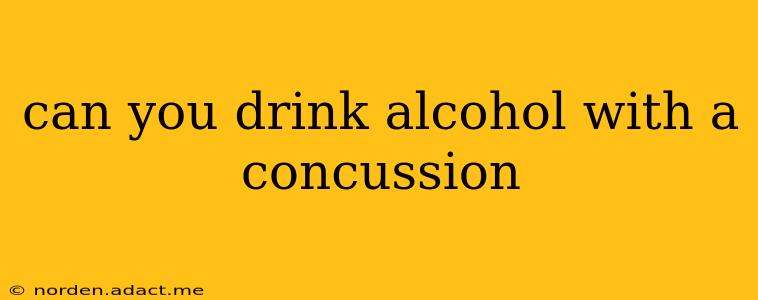A concussion, also known as a mild traumatic brain injury (mTBI), is a serious injury that requires careful management and recovery. One of the most frequently asked questions surrounding concussion recovery is whether or not it's safe to drink alcohol. The short answer is a resounding no. Alcohol and concussion are a dangerous combination, and consuming alcohol after a concussion can significantly hinder the healing process and even worsen the injury.
This article will delve deeper into the reasons why alcohol and concussion are incompatible, addressing common concerns and providing evidence-based information.
Why You Shouldn't Drink Alcohol After a Concussion
Alcohol acts as a depressant on the central nervous system. This means it slows down brain function. After a concussion, your brain is already vulnerable and working hard to repair itself. Adding alcohol to the mix further impairs brain function, potentially prolonging recovery time and increasing the risk of complications.
Here's a breakdown of the negative impacts:
-
Increased Inflammation: Alcohol can exacerbate inflammation in the brain, which is already present after a concussion. This increased inflammation can delay healing and worsen symptoms.
-
Impaired Healing: The brain needs time and rest to recover. Alcohol interferes with this process, preventing the brain from efficiently repairing damaged cells and tissues.
-
Exacerbated Symptoms: Alcohol can intensify common concussion symptoms such as headaches, dizziness, nausea, and cognitive impairment. This can make your recovery more difficult and uncomfortable.
-
Increased Risk of Long-Term Problems: Studies suggest that alcohol consumption after a concussion may increase the risk of developing long-term neurological problems, including post-concussion syndrome (PCS). PCS is a condition characterized by persistent symptoms that can significantly impact daily life.
-
Interaction with Medications: If you're taking medication for concussion symptoms, alcohol can interact negatively with these medications, potentially causing adverse effects or reducing their effectiveness.
How Long Should You Avoid Alcohol After a Concussion?
There's no definitive timeframe for when it's safe to resume alcohol consumption after a concussion. It's crucial to consult with your doctor or healthcare provider. They will assess your individual case, considering the severity of your concussion and your overall health. They can advise you on when it's appropriate to resume alcohol consumption, if at all. Generally, it's recommended to abstain from alcohol until your symptoms have completely resolved and you've received medical clearance.
What are the symptoms of a concussion?
Symptoms of a concussion can vary widely from person to person, but common signs include:
- Headache: Often described as a persistent throbbing or dull ache.
- Dizziness: Feeling unsteady or lightheaded.
- Nausea and vomiting: Feeling sick to your stomach.
- Blurred vision: Difficulty focusing or seeing clearly.
- Sensitivity to light and sound: Finding bright lights or loud noises overwhelming.
- Cognitive difficulties: Problems with memory, concentration, or thinking clearly.
- Fatigue: Feeling unusually tired or exhausted.
- Emotional changes: Irritability, anxiety, or mood swings.
- Sleep disturbances: Difficulty falling asleep or staying asleep.
It is vital to seek medical attention if you suspect you have a concussion. Early diagnosis and management are essential for optimal recovery.
Can I drink alcohol if I have a mild concussion?
Even a "mild" concussion still involves brain injury. While the symptoms might be less severe, it doesn't mean your brain isn't vulnerable and needs time to heal. Avoid alcohol completely until you've been cleared by a medical professional. Ignoring this advice could prolong your recovery or lead to more serious problems.
What are the long-term effects of alcohol consumption after a concussion?
Long-term effects of alcohol use after a concussion can include prolonged recovery time, increased risk of post-concussion syndrome (PCS), cognitive impairment, and other neurological complications. The extent of the long-term effects depends on several factors, including the severity of the concussion and the amount of alcohol consumed.
Is there any research on this topic?
Numerous studies highlight the detrimental effects of alcohol on brain recovery following a concussion. While specific research on the exact long-term consequences varies, the overall scientific consensus strongly advises against alcohol consumption during the healing period. Your doctor can provide you with more detailed information and relevant studies.
In conclusion, drinking alcohol after a concussion is strongly discouraged. The risks significantly outweigh any potential benefits, and it’s vital to prioritize your brain's health and recovery. Always consult your healthcare provider for personalized advice and guidance.
